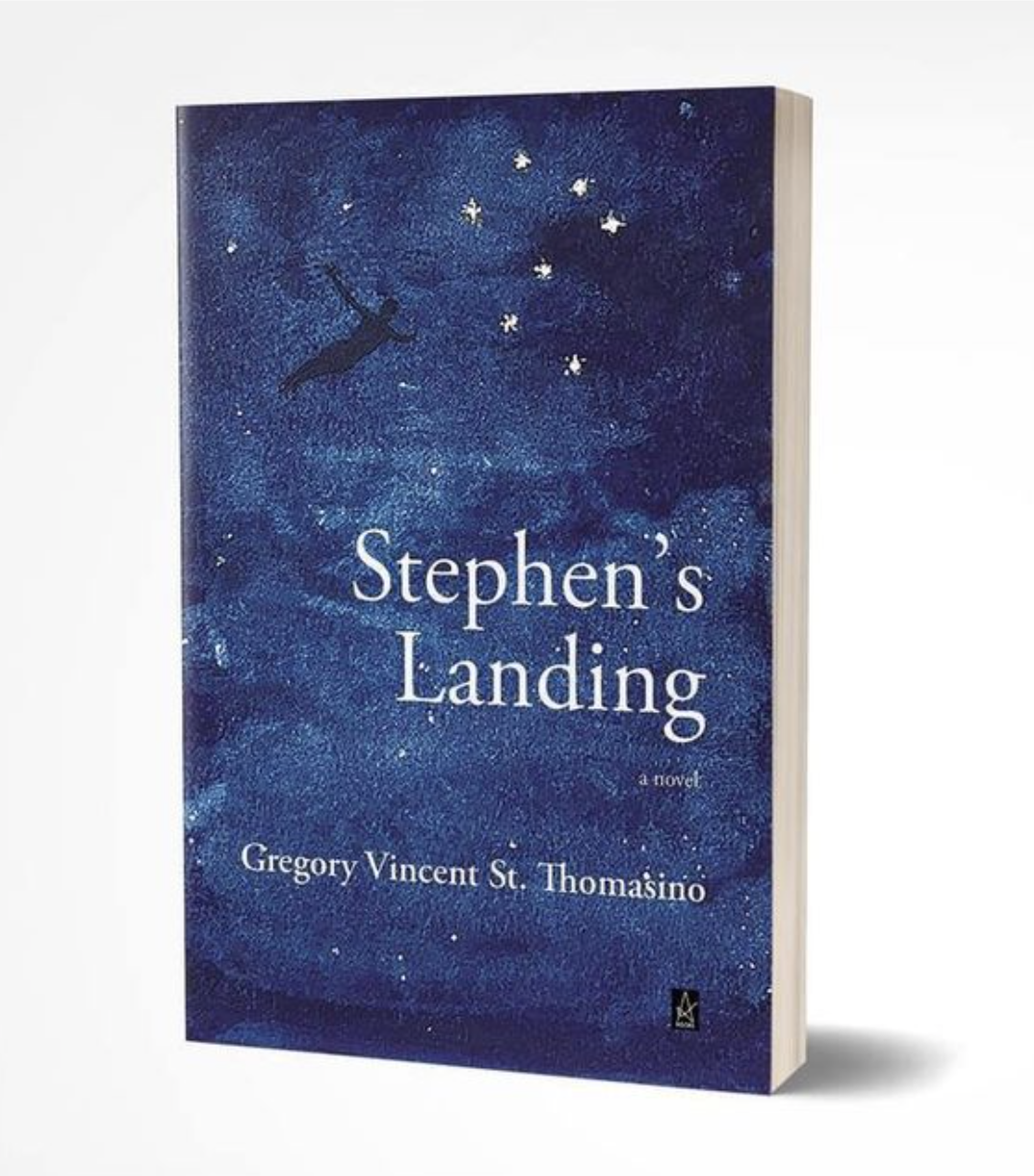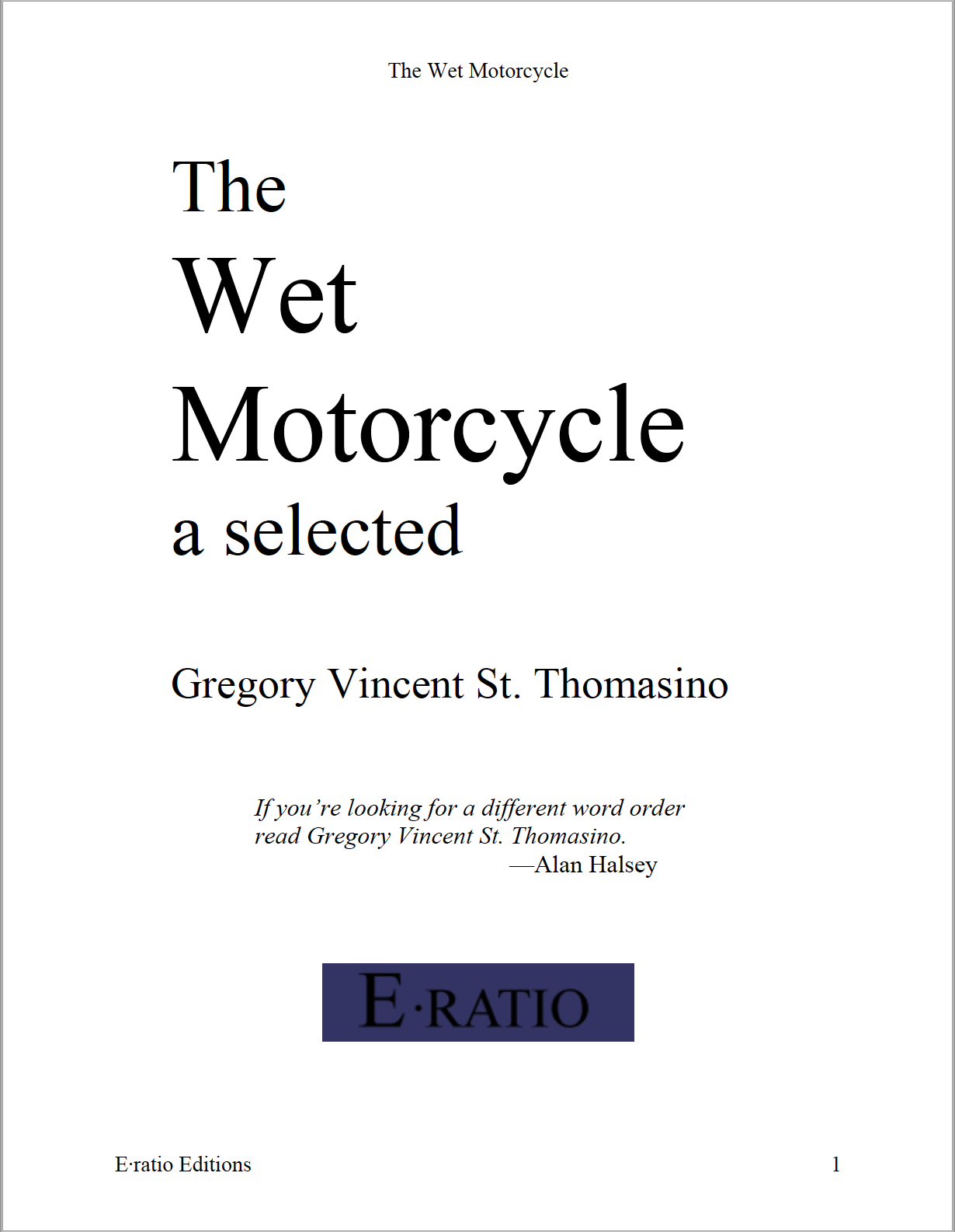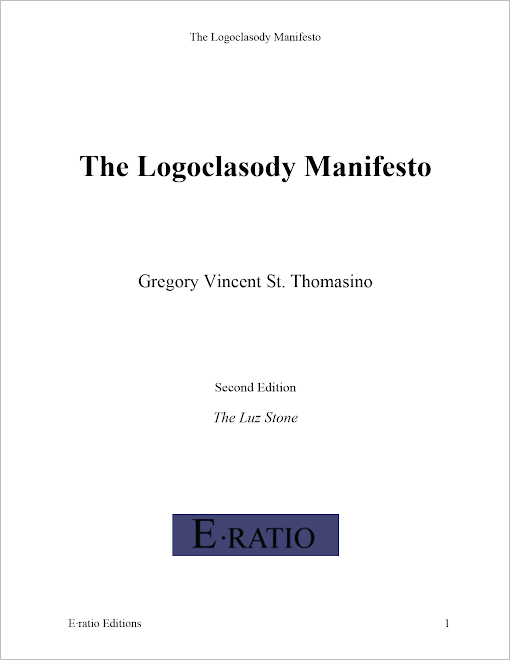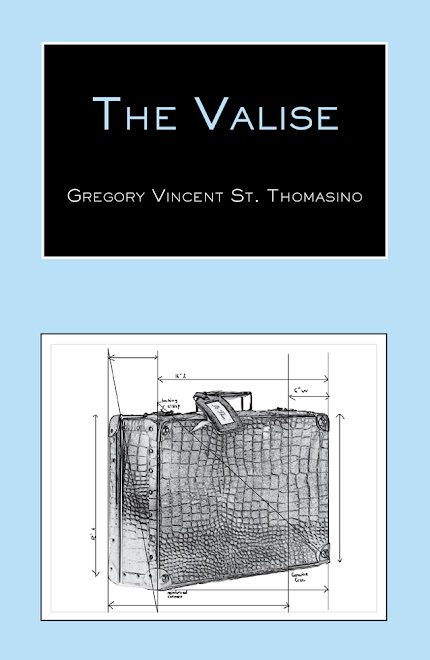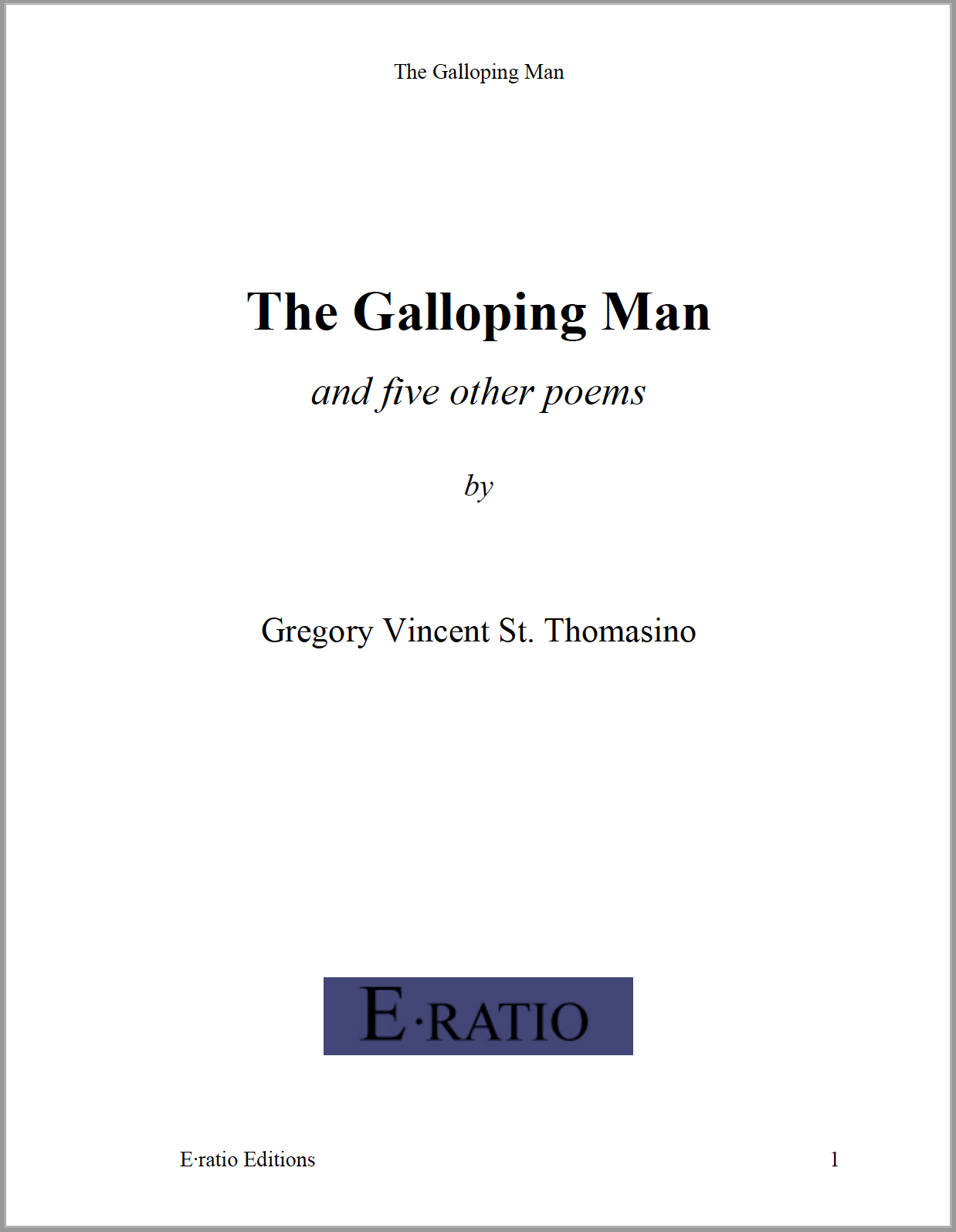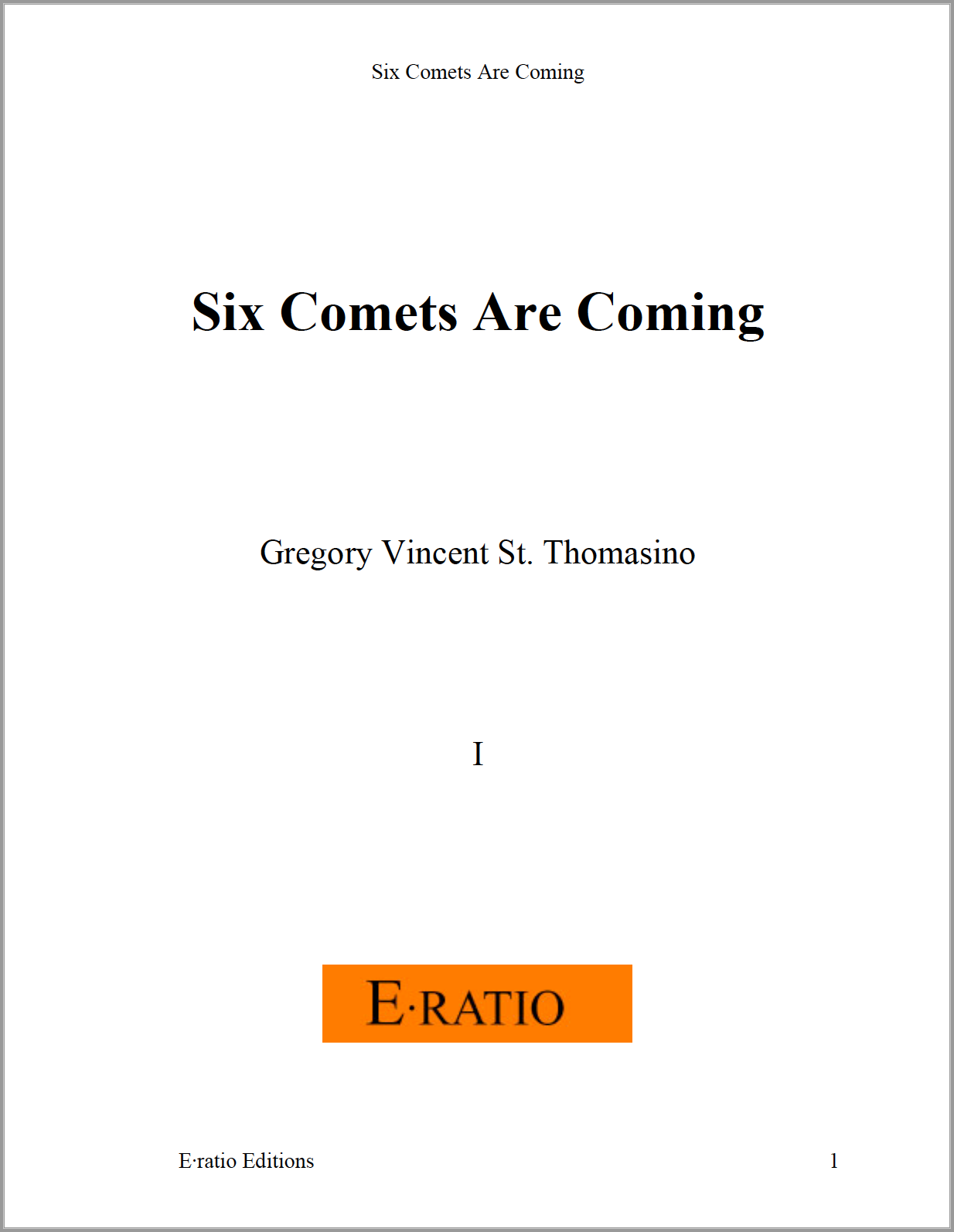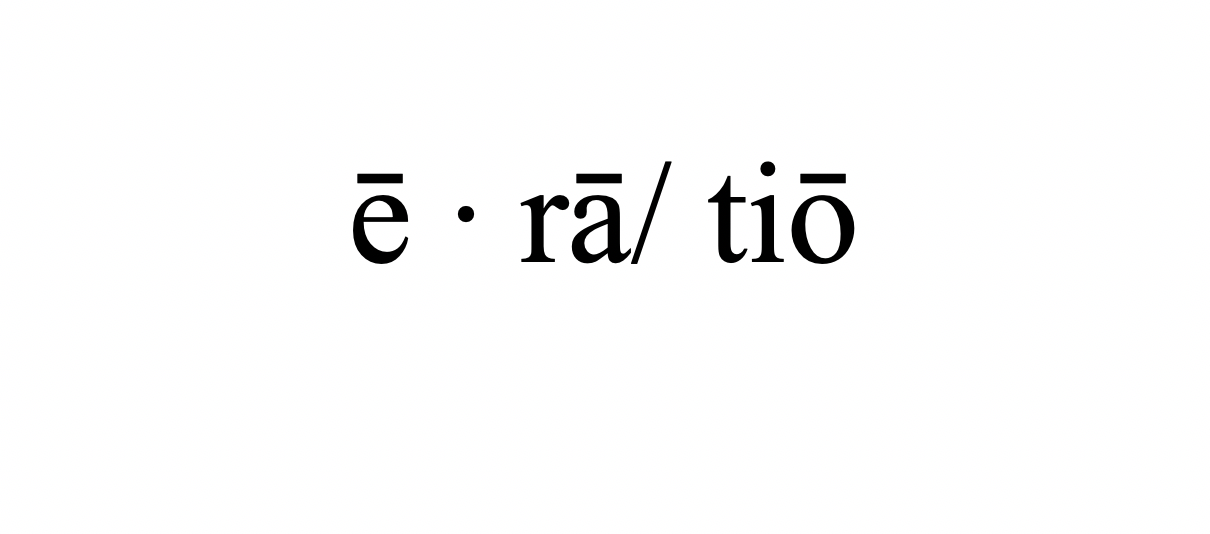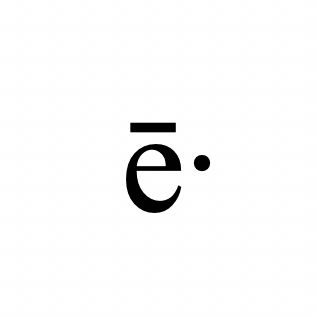“The discussion is wide-ranging and, in Gregory’s inimitable style, discursively reflective: a real inner-view of the artist in his philosophical universe.” — Carey Scott Wilkerson
Spring 2012 *
1. Your new
book The Valise seems, in some sense, to
be a series of radical containments and equally radical moments of
opening. I wonder if you develop
these ideas programmatically or if they emerge as you put the collection
together?
They develop programmatically, which I do emphasize is not
the same as algorithmically. They develop as a matter of form,
poetic form. But, see, the idea
is, and besides research into the poetic, the idea is to acquire for oneself a toolbox, so to speak, a technique
and a style, a methodology, as these are the means by which one proceeds and as
this is the stuff of one’s poetic signature. Still, the process, and in purpose and in procedure, is one
of discovery, is one of problem solving, it’s heuristic, and necessarily
so.
2. The book’s
title poem ends with absence, indeed, it
ends with the provocative image: “in absence,” which is here suspended without
final punctuation. In fact, this
is true of many of your poems. And
yet I feel there is here a kind of St. Thomasinian, invisible diacritical,
marking a distinctly Heideggerian aufhebung, but one that struggles with the idea of ends and
endings. What are the risks of leaving a poem’s final moment open to that sort
of hermetic drift? And I ask this
because, as Alan Halsey observes in his description which graces the back cover
of your book, you “[write] with a philosopher’s precision.”
The subject of poetry and punctuation—and immediately I’m
thinking of Dickinson and Cummings, and of Yeats and of Shakespeare’s
sonnets—and of what is appropriate and of what is necessary (to convey
significance in the poem) is of absolute interest to me, but first, please,
let’s hold on to “a series of radical containments and equally radical moments
of opening” and see these together with “absence” and “aufhebung” and what I
can make of “hermetic drift.”
Containments and openings are not a matter of punctuation for me, yea
punctuation is not a matter of containments and openings for me, not as such,
anyway, which is to say the purpose is not to draw the reader’s attention to my
punctuation, but rather and something to the contrary I intend my punctuation
to be a commentary on the sentence in poetry, and which is to say I do not
think the poetic can be expressed in sentence form any more (not in
“traditional” sentence form, that’s for sure), it’s at once, it’s
simultaneously this commentary, if you
will, and is itself of the grammar of my program, which is to say of logoclasody. I was
deeply into the study of W. B. Yeats, reading all the major studies of his work
and then of course A Vision, Essays and Introductions, Explorations,
The Autobiography, the plays, et cetera, The
Lonely Tower, The Man and the Masks, et
cetera, and reading his poetry I became intrigued, obsessed, really, with his
sentences, his sentence structure, and how he was writing in these long,
sophisticated, sort of, and down-right, run-on sentences. So I
became very aware of his sentence structure. And I became very aware of how poetry was written in
sentences—something I, myself, was doing, but was doing unconsciously, which is
to say I was writing sentences but my first intention was not to write
sentences but to write poetry! In
the writing of my sentences, I was concerned with the sentence as sentence, not
as a language via which my poetic is conveyed. I discovered for myself that the grammar of the sentence is
not the grammar of poetry, at any rate not of poetry as I envisioned
it, not of my poetry! This of course brought to mind the case
of Dickinson, whose, quoting Linscott, “erratic punctuation and lavish use of
capital letters were changed to conform to accepted usage,” and how “occasional
liberties were taken with the text in order to correct grammatical vagaries or
to clarify rhyme or meaning.” And
of course this brought to mind Gertrude Stein, and the punctuation of the
stream of consciousness “sentence.”
The grammar of the language (of the conversation, the discourse) was as
much an expression of that language (a subject matter) as was the depictions,
descriptions, imagistic evocations, as was the information being conveyed. I believe that Dickinson and Stein, and
as was Yeats, and Cummings, were “programmatically” searching, exploring
language in pursuit of poetry, of poetry and of its poetic elements. This is not to say that I believe there
was ever a time when poets thought of language, when they did think of
language, as an innocent bystander.
I think the idea of the poem as a work of language is a given throughout
history. But the idea that
language per se can be, but more
than merely expressive (as we see in, say, calligraphy), the idea that language
per se can be informative of its
own essence, of its own eidos, and as such of a poetry that is the Poetry
behind the poetry, of a poetry that is the ground of the, let us say,
ostensible poetry! This poetry
that is the Poetry behind the poetry, this is the end of poetry, and by “end”
think not of terminus but of “purpose,” or, more precisely, “fulfillment.” This is what poets have always been
after, and they did, and do, seek it in various and idiosyncratic ways, and
whether they have realized it or not, and they have known it by the frisson
that accompanies it. It is this frisson that the poet is addicted to, this is his high and
this is his reward, and with this he knows that his poetry is real. When the poet alters his
consciousness—for instance through drugs, or, even in madness, in the
cultivation of madness, or in neurosis, in the cultivation of neurosis, or in
the “long, intensive and reasoned (“reasoned” because with purpose!) disordering of all the senses” of Rimbaud, or in
the “self-discovery” of Basho or in some or other form of self-abuse—the poet
is seeking a pathway into poetry, and his frisson rewards him and guides him in
his pursuit. For myself, I don’t
think this “poetry that is the Poetry behind the poetry” is to be found in
“altered consciousness,” or else not exactly, rather I think it is to be found
in thinking. For myself, by way of
my own explorations into language, driven by my own poetic afflatus, in pursuit
of that eidos, in pursuit of this
Poetry—and this includes
Heidegger’s writings, and including the writings on the poet Hölderlin—I came
to understand poetic language as a matter of, what did we say, “containments”
and “openings,” but more as discontinuities and continuities, the word being in itself, the word as word
taken in its particularity, being a
discontinuity, while simultaneously being a sentence and thus being a
continuity, and more in that this sentence does not become a sentence until it
is perceived to be so (continuity and discontinuity are reunited in
observation, or, in perception, or, in the conscious, intentional act of
signification—a cardinal note of logoclasody—or, in thinking).
Consider, now, liken this to the quantum particle which is
simultaneously a particle, and thus a discontinuity, and a wave, and thus a
continuity, a continuum.
Discontinuity and continuity are reunited in nature. In thinking. So,
there is the sentence as a discrete, discontinuous structure, which is to see
it in its particularity, and, there is the sentence as continuous, the sentence
as wave. But the idea is not to be
stuck on language, or, rather, the sentence, as a discrete, discontinuous structure, that being a
word followed by a word followed by a word and so on. The discontinuity I’m thinking about is not seen, it is not
seen but it is intuited. The
discontinuity I’m thinking about is that space where in the conscious, intentional act of
signification the word behind the word breaks out, and in that logical
suspension thus thought is formed
a continuum (to the next word).
The word behind the word—I use the Greek word for this, logos. Logos
is the word behind the word. I
think to be stuck on the idea of language as a discrete, discontinuous
structure would be ignorant of the place of language, and of mind, in
nature. Language is not simply a tool
for conveying information, language reveals to us the Poetry behind poetry, the
word behind the word, or, if you prefer the Being behind beings, and it does
this in the conscious act of signification, whereby the logos breaks out, and
that’s logoclastics. With regard
to “absence,” when one packs his valise and takes leave, what he leaves behind
is “his absence,” and that is what we experience about him, we know him in his
absence. He is simultaneously gone
and known “in his absence.” And to
know someone “in his absence” is different, of course, than knowing him in his
presence. For one thing there’s a
sentimentality involved, in the reminiscence—we know the idea in the light of
that sentimentality. Throughout
most of the writing of the poems in The Valise—and one of the them, “The Crocodile,” was first
published in 1998—I was writing out of a deep sense of absence, a sense of loss
and, even, of grief. The loss of
my brother and then almost immediately, barely one year later, the loss of my
mother, the loss of my childhood, of my “innocence.” My deepest memories of my brother are of when we were kids
living in the country in New Jersey, we were naturalists and explorers and we
were quite the mythologizers, as in nothing was simply what met the eye but
rather everything had a mythology and was fecund (that’s a word I associate
with Yeats) with significance and with a sort of magic. Our world was enchanted. We used to take a broomstick and tie a
white flag to the end of it and we’d go out into the dark and wave the flag
high above our heads and this attracted the bats and the bats would swoop down
at the flag and that was our idea of having fun. I would say, everyone is entitled to his own mythology, and
I don’t mean that of Hollywood or comic books. One ought to, I think, make his own mythology. A life as literature. A grammar of one’s own. So far
as “hermetic drift,” to take it in the negative, I think no poem can be all
things to everybody, no poem can be all things to poetry. The poem has to be its own structure,
and that structure, and of necessity, I think, unless your thinking haiku or an
imagistic miniature, will be to a degree an instance of figure-ground. Now this is not to draw attention away
from “in absence (without period).”
The person who is “seen” in the first lines of the poem, a dancer (“an
attitude”) exercising at the barre, by the end of the poem is gone, and yet
something remains in her absence.
What remains? Is it simply
the mentioning in a poem? To take
it in the positive, between those first lines and that last word is depicted a
hermetic drift, a stream of consciousness. And about “marking a
distinctly Heideggerian aufhebung, but
one that struggles with the idea of ends and endings.” Consider, just as the particle is still
a particle even when it is a wave, the word is still a word even when it is a
sentence. There is a permanence of
identity—an invariance “hidden” behind the unending mutiplicity of the senses
of that identity. Is this a trick
of the mind? Or is it in the
nature of things? (Nature, and
mind, abhor a discontinuity.)
3. Formally, The
Valise is extraordinarily disciplined,
written entirely in two-lined stanzas, loosely the couplets of a venerable
tradition. I want to describe
these poems as rigorously experimental, but I’m not sure that’s quite
right. Can you speak to their
design?
They are designed to
make available to the reader a certain reading experience—on a poetic level,
one akin to trobar clus, and on
an aesthetic level one that is analogous to cubism in painting. If you consider cubism (analytical
cubism) experimental, then I suppose you can refer to a poetry, to this poetry, as experimental—experimental in the sense
that, say, I’m going to write a certain way and see if I can live with the
results. And like I said above,
the process is one of discovery and of problem solving, it’s heuristic, and
necessarily so. For instance, what
do I mean by “cubism”? What is a
cubist poetry? What does a cubist
poetry look like? Well, the
analogy is very simple, it’s based on faceted form. It’s the analogy between the geometric structure of the
painting and the grammar of the poetry (of the sentence). To facet grammar is to break it up, but
not to break it up gratuitously or “by chance,” you have to understand the
parts of grammar and know how they function. It’s not just a matter of breaking up syntax—you’re not just
putting syntax into disarray. If
something is “rigorously experimental,” then it is both theoretically and experimentally rigorous. Writing
in couplets (and in sonnets) seems intuitively and organically very comfortable
for me. I have no problem using
the term “couplets,” and I do intend mine to be more than just units of a
couple of lines each. Here’s an
example, from The Valise.
The Crocodile
in stress and carriage
in darning pleats and salts
and bearing certain ordinary likenesses
or to pass, unrecognized
in tide.
in shallows and remove
in summer lists and anthem
is making face of boot and purse
4. “The
Archaeology of Palestine,” a Pushcart-Nominated poem, encodes the intimacy of
things lost to time but holds history up to the tests and texts of its
“didaskalos” and inscribes “the names” and “the letters” in the proving grounds
of imaginative experience. How, as
an artist, do you reconcile the power of art with the twin forces of the “wand
and schedule of tides”?
“Wand and schedule of tides,” that’s Moses. This is his science and his magic. His gramarye. Moses was in conversation
with God. Jesus, the didaskalos, gave his disciples a language, a prayer, with which to have a conversation with God, it’s
called, Oratio Dominica, or, “The
Lord’s Prayer.” I think by “power
of art” we mean the power art has
to evoke a time and a place and an experience and to make available to the
reader an insight. If there is no
insight, the work runs the risk of being gratuitous, and exploitative (—art can
disseminate propaganda, and art can degenerate into “agitprop”). The power of art is its power to bear
witness. (And that is through
depiction. The language of art is
not the “message” one writes in however “artistic” a fashion on a placard to be
carried during a demonstration, it’s a language of symbols and of depiction. Otherwise there’s a risk the “art,”
with its power to enchant, can lead to deception.)
5. Will
language survive its own competing narratives?
Well, by “language,” let’s say we mean “poetic
language.” The language of
poetry. Let’s say we just mean poetry. Now
there’s a lot of poetry that we can call, and that I do call, “ordinary
language poetry,” that is exactly the sort of poetry I am not talking
about. And by “narratives,” let us say the narratives of
technology, and I’ll define “technology.”
By “technology” I mean “ordinary language.” And, certainly, “ordinary language” can include symbols and
depictions, “ordinary language” is also computer code. So I make a distinction between “poetic
language” and “ordinary language.”
“Ordinary language” gives us information. “Poetic language” does more than give us information, it, as
I said above, reveals the Poetry behind the poetry, the word (or, logos) behind the word. (Doesn’t all language do this? Yes, but in poetry we celebrate it, we practice it for the
sake of it, in poetry we write in the consciousness of it, we sing of
it.)
Here’s an idea: The poet as generator of language. In what sense is the poet a “generator
of language”? The poet is a
generator of language in that he produces metaphors and metaphors produce
semantic changes and semantic changes increase language. In this, poets are in competition with
“technology” which also generates language, language in the form of, for
instance, neologisms, catch-phrases, slogans, for example “the one-percent,”
“the ninety-nine percent,” these slogans compete with “the road not
taken.” Will language
survive? Yes: Language has had the
first laugh and language will have the last laugh.
*This interview originally appeared at the Dead Academics Press Page at Facebook.
*This interview originally appeared at the Dead Academics Press Page at Facebook.
e·

